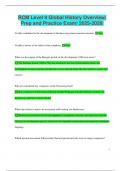RCM Level 9 Global History Overview|
Prep and Practice Exam| 2025-2026|
Vivaldi contributed to the development of the three-movement concerto structure. True
Vivaldi is known as the father of the symphony. False
What was the impact of the Baroque period on the development of Western music?
The Baroque period (1600-1750) was marked by the rise of instrumental music, the
development of opera, and the introduction of new musical forms like the concerto, sonata, and
oratorio.
Who are considered key composers of the Classical period?
Key composers of the Classical period include Wolfgang Amadeus Mozart, Ludwig van
Beethoven, and Franz Joseph Haydn.
What innovations in music are associated with Ludwig van Beethoven?
Beethoven was known for his development of symphonic structure, his transition from the
Classical to the Romantic period, and his use of expanded orchestration and expressive harmonic
language.
Which musical movement followed the Classical period and who were its major composers?
1
, The Romantic period (1800-1900) followed the Classical period, with major composers such
as Johannes Brahms, Franz Schubert, Richard Wagner, and Pyotr Ilyich Tchaikovsky.
How did the invention of the piano affect music during the Classical and Romantic periods?
The invention of the modern piano allowed for greater expressive range, dynamic contrast,
and intricate textures, which influenced composers like Beethoven, Chopin, and Schumann.
What is the significance of opera in the Classical period?
Opera reached its peak during the Classical period with composers such as Mozart, who
elevated the genre through dramatic, vocal, and orchestral innovation in works like "The Magic
Flute" and "Don Giovanni."
How did the French Revolution influence music composition?
The French Revolution inspired composers like Beethoven, who infused a sense of
nationalism, heroism, and revolutionary themes into his music, most notably in his "Eroica"
Symphony.
What is the role of nationalism in 19th-century music?
Nationalism became a prominent feature of Romantic music, with composers like Bedřich
Smetana, Giuseppe Verdi, and Richard Wagner incorporating folk tunes, national history, and
cultural symbols into their works.
What are the defining characteristics of Impressionism in music?
2
, Impressionism in music, led by composers like Claude Debussy and Maurice Ravel, is
characterized by the use of non-traditional scales (such as the whole-tone scale), ambiguous
tonality, and emphasis on atmosphere and color over structure.
How did opera evolve during the 19th century?
Opera became more dramatic and emotionally expressive during the 19th century, with the
development of the grand opera and verismo styles, exemplified by composers like Verdi and
Puccini.
Which musical form did Franz Schubert primarily contribute to during the early Romantic
period?
Franz Schubert made significant contributions to the Lied (German art song) form, creating
over 600 songs, including famous works like "Ave Maria" and "The Trout Quintet."
What was the role of the symphonic poem in 19th-century music?
The symphonic poem, pioneered by Franz Liszt, is a one-movement orchestral work that
tells a story or conveys a scene, influencing composers like Richard Strauss.
How did Beethoven's late quartets differ from his earlier quartets?
Beethoven's late quartets are marked by greater complexity, extended harmonic exploration,
and deeper emotional expression, reflecting his philosophical and personal struggles.
How did Romantic composers approach orchestration?
3





